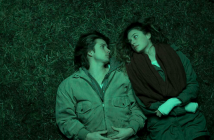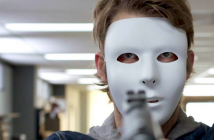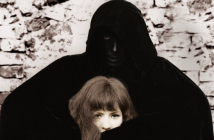The Pin (2013)
Cast: Milda Gecaite, Grisha Pasternak, Paskal Vaklev
Director: Naomi Jaye
Country: Canada
Genre: Drama
Official Site: Here
Editor’s Note: The following review is part of our coverage for the Toronto Jewish Film Festival, which runs from May 1st to May 11th. For more information please visit tjff.com or follow the Toronto Jewish Film Festival on Twitter at @TJFFtweets.
There is a quiet beauty to The Pin, the first and only Yiddish language film ever produced in Canada. It’s not a language one hears in film that often, though there used to be a bustling sub-genre in the 30s and 40s that produced the great Tevya (1939) which is Fiddler on the Roof (1971) without the musical numbers (and the only other Yiddish film I’ve ever seen).
The language that the film is in is somewhat inconsequential given the power behind it all. It focuses on the story of a Shomer (David Fox), a man who according to Jewish custom stays with the body of a recently deceased person until the burial process can begin. His name is Jacob (but we don’t get that until later during a flashback, where he is played by Grisha Pasternak) and one night, he is asked to cover for another person. While sitting and reading, the corpse’s arm suddenly slips off the table. When he looks at it, he recognizes it, causing him to remember back to WWII.
There is a quiet beauty to The Pin, the first and only Yiddish language film ever produced in Canada.
The flashback takes us to a wooded area with a young man, wounded in his left arm and running for his life. He happens upon an abandoned barn in severe disrepair where he decides to hide. Eventually he discovers that he is not alone, sharing the barn with a woman also on the run: Leah (Milda Gecaite). She helps nurse his arm and gets food and water for them. Over time, they fall in love and have an ad hoc wedding and make plans to jump an empty supply train bound for the boarder (which boarder is not stated) where they can get to America, where Jacob’s cousin is.
The heart of the story is really not the plot but the slow burn to the kids falling in love and how they both have to overcome the fear instilled in them from being hunted down by Nazis (or possibly Russians, they weren’t too friendly to the Jewish people either). Jacob is resistant to help from Leah and it’s the slow way he wears down and starts to trust her that is part of the beauty of the film. He seems so used to being on his own that he can’t fathom someone wanting to help, or that he may need it.
Writer/director Naomi Jaye goes a long way to establishing an astonishing tone of fear that pervades the film, guiding all of the characters’ actions. There is also an air of melancholy to the scenes of the older Jacob and his actions during his night with Leah’s corpse. Her screenplay is brilliant in the way that it focuses on small conversations that end up having a big impact on the characters. Very little of what is discussed is of great import overall, but it takes down the walls that fear has erected around these individuals. The whole film is quiet and slowly paced to give the feeling that this takes place over the course of some time, weeks perhaps even months. The audience bonds with them as much as they bond with each other, making the conclusion of the flashback all the more tragic.
She also uses the space of the barn to great effect. There is a lot of negative space used to show how isolated they are, but when they hide the framing is cramped and claustrophobic. The framing is particularly important since she decided to go with a widescreen, 2.35:1 aspect ratio instead of a smaller, more intimate one. She fills this wide screen with beautiful landscapes and a rich color palate. Her use of color and deep hues is refreshing, since most WWII pictures post Saving Private Ryan (1998) use a dulled, almost black and white color scheme. The film is beautifully lit by DP Michael LeBlanc, who with Jaye seems to understand that color helps serve a love story best.
Writer/director Naomi Jaye goes a long way to establishing an astonishing tone of fear that pervades the film, guiding all of the characters’ actions.
Then there are the primary actors Pasternak and Geciate. Pasternak is excellent as Jacob. He is never too overt with his emotions but communicates them with seeming ease. His hardened expressions tell us more about his character than the dialogue ever does and we see in him someone who wants to hope but doesn’t feel he dares to. He plans to escape and get to America but there is a sense that he can’t expect to make it. He steels himself from fear and is a rock for poor Leah who has terrible panic attacks when they can hear people and dogs in the surrounding area, although his calm is a front for nervous energy, constantly being on guard and never really relaxing.
Geciate is Pasternak’s perfect counterpoint because she is nothing but hope. So much so that she wants to stay in the barn thinking that they can stay there indefinitely. Ironically, she is a calming energy to his nervousness. She is able to get him to relax a little and open up about what happened to his family and some of his youth. Geciate plays Leah as somewhat mysterious, seldom if ever opening up about where she came from or how she got to the barn in the first place.
The scenes in the morgue with Fox are delicate and deeply felt. The older Jacob feels guilty because of how the two parted. He remembers back to his time with her in the barn and recalls a promise he made to her on the occurrence of her death. It’s the explanation of the title of the film and I don’t want to give that away, but suffice it to say that it is elegant and poignant.
It’s really rather astonishing that this is Jaye’s feature debut. It’s assured and confident in all aspects. She directs her actors expertly, frames the shots perfectly and wrote a beautiful screenplay. It is genuine all the way through and circumvents most of the trappings of a WWII film depicting Jewish people on the run by paring down the scale to two people and ignoring the broader picture for the most part. She takes a tragedy and makes something good out of it, even if it is fleeting.
It’s really rather astonishing that this is Jaye’s feature debut. It’s assured and confident in all aspects. She directs her actors expertly, frames the shots perfectly and wrote a beautiful screenplay. It is genuine all the way through and circumvents most of the trappings of a WWII film depicting Jewish people on the run by paring down the scale to two people and ignoring the broader picture.




